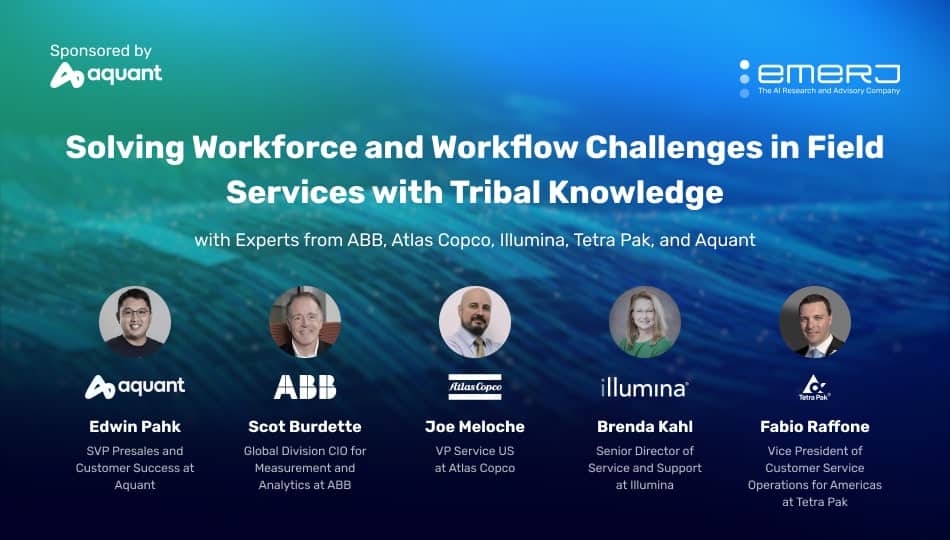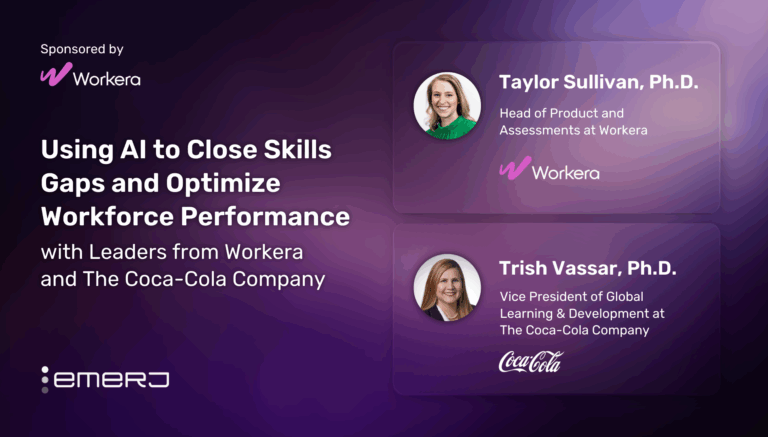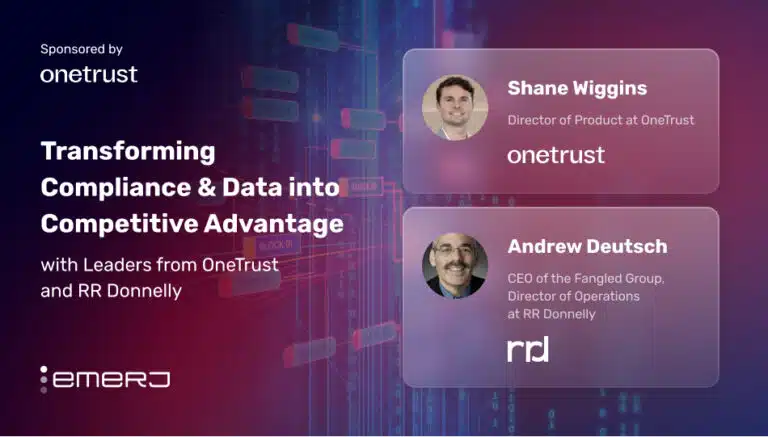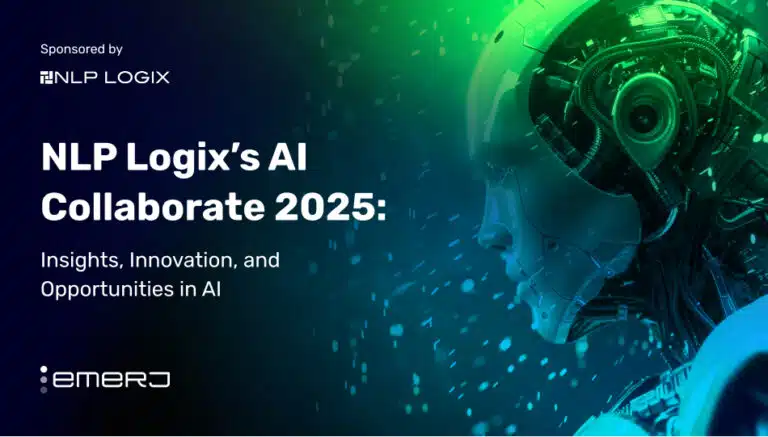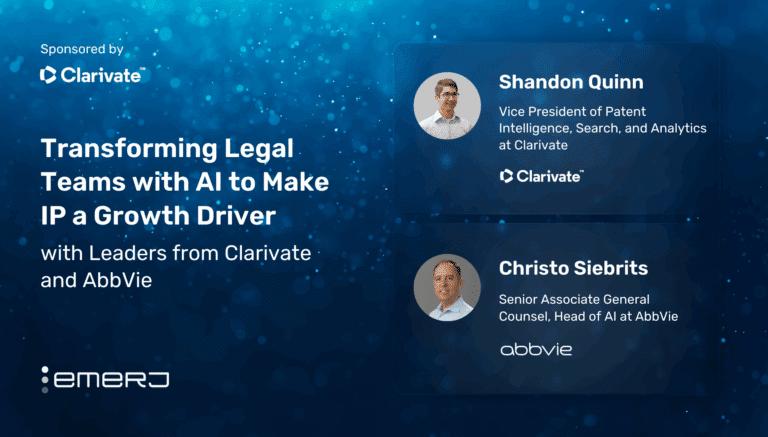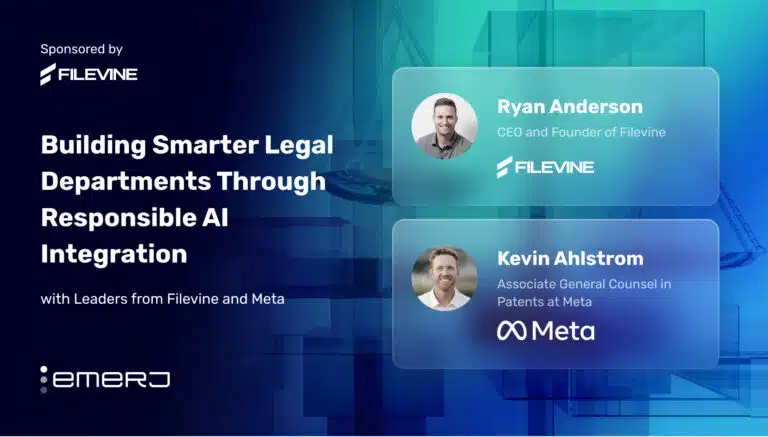This interview analysis is sponsored by Aquant and was written, edited, and published in alignment with our Emerj sponsored content guidelines. Learn more about our thought leadership and content creation services on our Emerj Media Services page.
Since the end of COVID-19, enormous transitions in the workforce have been particularly hard for service industries. According to reporting from the US Chamber of Commerce, nearly 130 million workers combined quit their jobs between 2021 and 2023 – representing what most experts call the “Great Resignation.” The resource also notes that in-person jobs are traditionally more difficult to retain.
These talent challenges are being acutely felt in the field services space. A survey from the Service Council found that 50% of organizations are currently working with more demand than they have resources to accommodate and that 70% of service leaders overall reported facing significant retirement burdens in their workforce over the next five to 10 years.
One of the major forces behind these trends is a strong preference among field service technicians for independent contract work. According to this year’s “State of Independence” report from MBO Partners, 72.1 million Americans are now working independently, accounting for roughly 45% of the total workforce. Meanwhile, a recent Field Nation survey revealed that 98% of field service technicians express a preference for independent contracting to some extent.
The race is now on for service leaders to fill these gaps with all the tools at their disposal. While AI poses many benefits for hiring and recruitment for any organization, field service leaders are finding new technical disciplines like tribal knowledge hold the keys to addressing many of the forces behind the Great Resignation long-term.
Emerj Artificial Intelligence Research recently sat down with experts from Aquant and several field service organizations – including ABB, Atlas Copco, Illumina, and Tetra Pak – to talk about these challenges and how new AI-driven use cases in tribal knowledge and beyond are making a difference. Aquant is an AI-powered technology firm that develops a copilot platform designed to enhance service workflows.
Throughout the series, these leaders identified challenges from the gig economy to changing technology. In the process, they identified new ways that organizations are leveraging data to ensure that organizational knowledge (also referred to as “tribal knowledge”) stays with the enterprise, no matter if talent is retiring or just not available for that particular meeting on the Slack channel.
This article summarizes the following actionable insights for field service leaders deploying AI tools to address workforce challenges:
- How to institutionalize tribal knowledge
- Driving structured data governance for improved performance
- Creating an AI-driven repository to capture and centralize tribal knowledge
- Optimize service operations with digital integration
- Hiring for soft skills and training for technical skills
Throughout all five episodes, these enterprise leaders emphasize the importance of:
- Streamlining data processes with the right metrics to drive reliable service outcomes
- Leveraging data streams to minimize silos between divisions of the business
- New hiring strategies that emphasize versatility and large-scale problem-solving
Emerj would like to thank our guests for sharing their knowledge and perspectives on workforce challenges in field services. In the episode summaries below, enterprise leaders can find a breakdown of these insights and how best to frame their application to the widest possible range of industries and contexts.
Institutionalizing Tribal Knowledge
Episode: The Importance of Tribal Knowledge for the Success of AI Adoptions – with Edwin Pahk of Aquant
Guest: Edwin Pahk, Senior Vice President of Customer Success and Customer Pre-sales at Aquant
Expertise: Data Analytics, Technical Pre-Sales, Product Management
Brief Recognition: Edwin Pahk is the Senior Vice President of Customer Success and Customer Pre-sales at Aquant. Prior to working with Aquant, Edwin worked at Salesforce and Click Software, where he served the roles of Principal Solution Engineer in Field Service Lightning and Solution Consulting Manager, respectively. He earned his Master’s Degree in Information systems from Northwestern University.
Edwin’s podcast appearance highlights tribal knowledge as a way to capture the expertise of long-term subject matter experts (SMEs) within organizations. He notes that 20-30% of identified problems and solutions are not documented, but rather, exist in the minds of these experts. As the workforce changes with more employees retiring or frequently switching jobs, it’s essential to convert this tribal knowledge into structured data for AI analysis.
Edwin also emphasizes that relying solely on manuals is inadequate, as they often don’t reflect real-world scenarios. The goal is to institutionalize working knowledge to enhance problem-solving and establish best practices, ensuring valuable insights are preserved.
He then discusses the evolution of Aquant’s approach to data-based workforce solutions for field service leaders as well as for their own enterprise needs. Initially, they believed that simply inputting historical service data, case data, and contact center interactions into an AI engine would yield effective problem-solving capabilities. However, these methods did not produce the desired results.
In turn, they recognized the importance of capturing specific insights from subject matter experts (SMEs) about problem-solving, or tribal knowledge. Instead of relying solely on generic data, they now use historical data to understand stated problems and solutions and then incorporate SME opinions on the effectiveness of those solutions. Aquant finds that a tribal knowledge approach avoids rigid, manual processes and instead focuses on context-driven insights.
By considering various factors like the asset’s history, the quality of parts, and the technician’s expertise, field service organizations can provide more personalized experiences for customers that enhance technician decision-making on the ground. Edwin sees the underlying transition from analyzing generic to historical data in addressing workforce challenges as representative of a more nuanced understanding of context and expertise in driving AI solutions overall for Aquant.
Driving Structured Data Governance for Improved Performance
Guest: Scot Burdette, Global Division CIO for Measurement and Analytics at ABB
Expertise: Project Management, Agile Methodologies, Analytics
Brief Recognition: Scot is the CIO for Measurement and Analytics at ABB. Prior to joining ABB, Scot served as VP of Managed Services for Columbus, OH-based Information Control Corporation (ICC) from 2001 to 2014. He has over 40 years of experience in technology and service-based roles.
In the second episode of the series, Scot highlights the challenges of servicing equipment across remote locations, involving complex logistics, customized setups, and ongoing service needs. He notes that supply chain issues have impacted the production and delivery of both equipment and spare parts, which are critical for maintaining operations.
He tells Emerj’s executive podcast audience about the overwhelming amount of data faced by service enterprises in particular and the growing pressure to extract insights to improve performance. The sense of overwhelm has led to increased demand for better data access and tools, driving the push for data democratization across the field services space and beyond.
Among workforce trends, Scot observes that, ultimately, technicians want fewer barriers and limited governance, avoiding gatekeepers that slow down decision-making. However, he also cites the need to balance quick access with proper data interpretation to ensure informed decisions, not just rapid ones.
To drive effective outcomes in balancing data governance needs with technician concerns, Scot emphasizes the importance of using the right tools to analyze and understand data. He warns against giving people unrestricted access to data without guidance, as it can lead to misuse or misinterpretation. AI-enhanced tools and cloud storage can help, but there needs to be governance policies in place from management to ensure data is used correctly and insights are accurate:
“There are multiple development tools and reporting tools that you can use. Some you can download off the internet, some you have to pay for, but there are tools everywhere that people want to use and try to get insights and data that they haven’t been able to see before. The idea is to do it and do it well. Without some sort of governance, you’re going to run into trouble.”
– Scot Burdette, Global Division CIO for Measurement and Analytics at ABB
Creating an AI-driven repository to Capture and Centralize Tribal Knowledge
Episode: Addressing the Field Services Brain Drain – with Joe Meloche of Atlas Copco
Guest: Joe Meloche, Business Line Manager for Service in North America at Atlas Copco
Expertise: Field Services, Operations Management
Brief Recognition: Joe Meloche is the Business Line Manager for Service in North America at Atlas Copco. He has been with Altas Copco for close to two decades. He earned his MBA in marketing and another Master’s Degree in operational research from the University of Michigan.
In his podcast episode, Joe begins by describing the challenge of capturing and centralizing tribal knowledge, constituting valuable but often undocumented expertise shared informally among employees. He explains that problems solved locally – especially for international business operations – are not systematically recorded, making it difficult to share solutions across the organization.
Traditionally, tribal knowledge is only shared casually, as in over conversations at a bar or through service tickets, which are rarely observed by official data-gathering processes within the enterprise.
Joe emphasizes the need for an organizational repository to store tribal knowledge, but hiring a team to organize it manually would be too time-consuming. He notes that streamlining the data gathering and storage processes is where AI brings much of its value to field service organizations. AI-enhanced systems can quickly sift through service tickets and organize past solutions, allowing the company to access and utilize this knowledge more efficiently.
Noting the origins of the term, he uses an analogy for tribal knowledge in early humans marking the spot to spear a mammoth as a form of “tech support:” without documentation, valuable knowledge is lost. Similarly, AI-driven systems can help preserve and share information before it disappears.
Joe explains the varying levels of adoption among employees for a new AI tool using a fairly recent example. After running a trial, he found that the Atlas Copco workforce was divided into four groups:
1. 25% refused to use the AI tool at all.
2. 25% were hesitant but may be convinced to use it.
3. 25% will use it but don’t want to train it, fearing mistakes will be attributed to them.
4. 25% were enthusiastic and wanted to adopt it immediately.
He expects that by the end of the six-month trial, half of the workforce will be using the AI tool regularly, while the rest will take a few years to adapt thoroughly. He plans to encourage adoption through cultural shifts, such as promoting the use of AI tools before consulting specialists, with full adoption projected to take two to three years:
“And it’ll take a while for the diehards to get past that it will do cultural things like when you call one of the specialists, and you ask them question that they know is in the AI. The first question will be, ‘Did you ask the copilot? But why didn’t you ask the copilot?’ So we can push the other 50% into at least trying to culturally, and then through its performance, the copilot will pull them into using it in a regular job. It’s a few years out before that happens. So I’ll have early adoption later this year and full adoption probably two or three years from now.”
– Joe Meloche, Business Line Manager for Service in North America at Atlas Copco
Optimize Service Operations with Digital Integration
Episode: Driving Training Workflows with Tribal Knowledge – with Brenda Kahl of Illumina
Guest: Brenda Kahl, Senior Director of Service and Support at Illumina
Expertise: Genetic Analysis, Genotyping, DNA Sequencing
Brief Recognition: Brenda Kahl is the Senior Director of Service and Support at Illumina. She leads a multi-disciplinary team in field service as well as applications in both RUO and clinical laboratory environments. She is also responsible for post-sales support of sub-region annual revenue.
In this episode, Brenda emphasizes the importance of metrics in optimizing service operations, starting with the call center as the foundation of Illumina’s processes. She highlights the need to measure the dispatch rate, which indicates how often issues can be resolved over the phone compared to sending a technician on-site, as improving this metric can lead to increased efficiency and reduced costs.
Additionally, she stresses the importance of identifying customer issues as soon as possible, noting that better digital tools can help reduce the time it takes to either resolve the problem during the call or dispatch a technician. Doing so ideally shortens the dispatch time from days to hours. Once in the field, the mean time to repair becomes crucial, as having accurate and easily accessible information allows technicians to achieve a “first-time fix” that minimizes repeat visits and enhances overall service efficiency:
“Especially with the evolving work environment, the work-from-home becomes a driver – our ability to then employ digital tools that use things that are written and visual, so that you don’t need to travel someplace to get training. It’s now, ‘Here’s the issue. Here’s how you fix it. Here’s the video. Here’s how that is done.’ becomes a very different world from what traditionally field service has been.”
– Brenda Kahl, Senior Director of Service and Support at Illumina
Having such certainty in training resources and communications enables call centers to integrate more closely with field service teams, as they document issues and resolutions in real-time. If a problem is resolved remotely, that information enriches the overall knowledge base, making insights therein readily available to both call center agents and engineers.
Brenda also tells Emerj that today’s workforce is more comfortable in a digital landscape, where information can be quickly searched and accessed, akin to how many everyday users learn to complete complex tasks through YouTube videos. Acclimating the enterprise to the digital fluency of a younger workforce enhances efficiency and retention of knowledge, as employees are enabled to immediately find and utilize the resources they need to perform their tasks effectively.
Hire for Attitude, Train for Skills
Guest: Fabio Raffone, Vice President of Customer Service Operations for Americas at Tetra Pak
Expertise: Training, Field Service Operations
Brief Recognition: Fabio has been with Tetra Pak for the last 16 years, specializing in leading hiring and training teams for the company’s overseas operations. Fabio started in support management positions at Tetra Pak after leaving Nestle as an industrial performance manager in 2008.
Fabio’s appearance in the podcast series emphasizes the importance of hiring employees with a strong foundational mindset and penchant for soft skills, as these traits are crucial for effective communication and problem-solving in field service contexts. Technical skills can be taught later, but he emphasizes that, throughout field services, having the ‘right attitude’ is becoming more essential for the success of technicians.
The new focus on softer, more transferable skills that Fabio describes for hiring in field services is similar to the changes happening in areas such as software development, where experts are increasingly expected to be “Swiss Army knives” – or rather, able to handle ever more complex and larger scale problems with less direct experience than ever before.
Fabio shares an example of the value of softer skills where a less technically proficient engineer was favored by a customer due to their excellent communication, demonstrating to the organization that customers value being informed during technical delays. He notes the organization is willing to invest about 15% of service delivery engineers’ hours into developing technical skills, leaving a vast majority of the value in skills that the organization cannot teach on its own.
Fabio also underscores the importance of helping technicians feel engaged in Tetra Pak’s larger mission to ensure food safety and availability while protecting people and the planet. Without that sense of purpose, he cautions the executive listening audience, it is more difficult to achieve the best outcomes from any service team.
Fabio then introduces the concept of a “Red Carpet ambition,” where the goal is for customers to feel excited and welcoming during engineer visits, reflecting satisfaction with the previous service. By fostering a sense of belonging and competence among the team, employees are encouraged to deliver value consistently during customer interactions, as their connection to the mission drives their performance.
Finally, Fabio espouses that talent leaders hold a proactive attitude toward employee turnover, viewing promotions to other teams as a win for the organization rather than a loss for specific team. A more optimistic approach encourages employees to seek advancement, which, in turn, increases their loyalty to the company. He describes how these factors can be prioritized in the data-gathering process, giving listeners an insider’s look at how Tetra Pak prioritizes both employee and customer experiences in their performance metrics:
“You want a good level of overtime because this goes hand-in-hand with work-life balance, which is extremely important. You want proximity to customers, and you want to reduce travel time, which will allow heavy spending of time on the customers. We want to minimize international travel whenever possible. Then all the metrics on customer satisfaction: the CX, the NPS score… We have a performance rating right after maintenance, so we want the machine to perform better after we touch the machine than how we found it before.”
– Fabio Raffone, Vice President of Customer Service Operations for Americas at Tetra Pak


